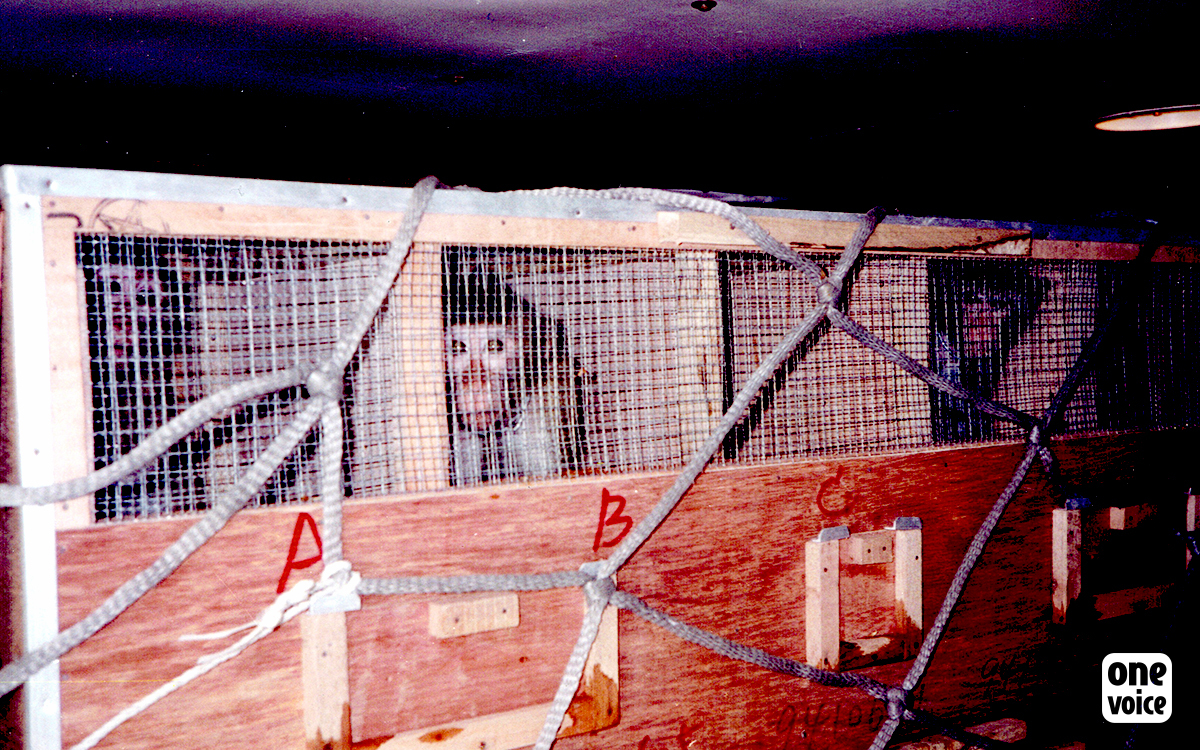

On 14 April on Flight 473, Air France transported 100 monkeys from Mauritius bound for a British laboratory
On 14 April at 6 o'clock in the morning, a passenger flight from Mauritius landed in Roissy, probably full of tourists coming back from their holidays on the idyllic island. What these passengers did not know was that 100 terrified monkeys were just beneath their feet in the hold.
On 14 April at 6 o’clock in the morning, Air France 473, an overnight passenger flight coming from Mauritius landed at Charles de Gaulle airport (CDG), probably full of tourists coming back from their holidays on the idyllic island. What these passengers did not know, while they were appreciating their comfort on the flight, was that 100 terrified monkeys were just beneath their feet in the hold. What a violent contrast between these holiday-makers and the imprisoned monkeys in crates. For the latter, the final destination was a British test laboratory in which they will endure the worst before certain death.
An eleven-hour fight before… a lab bench.
A concerned worker at Roissy airport warned Action for Primates and One Voice after having learnt the fate awaiting these long-tailed macaques shipped as cargo. From Paris, the monkeys were subjected to more hours of confinement in crates during their transportation to the United Kingdom. We suspect that they were transported by the German carrier Bin Air from France to the United Kingdom, arriving at Manchester Airport, a key destination for monkeys imported into the United Kingdom for the research and toxicity testing (poisoning) industry. The final destination for the monkeys was Labcorp (previously known as Covance) in Harrogate, a global research company specialising in pharmaceutical, chemical, and phytosanitary product testing.
A non-transparent and despicable trade
One Voice and Action for Primates have already revealed the secret and cruel world of the trade and transportation of monkeys into Europe to be used in laboratories and the role of Air France in the regular transportation of monkeys from Vietnam and Mauritius into Europe. The island of Mauritius is the main supplier of monkeys for European and American laboratories, exporting more than 14,000 of them in 2021. France is one of the countries at the heart of this cruel trade, with Silabe (Simian Laboratory Europe), a company based in Niederhausbergen, being used as a known stopover for importing hundreds of monkeys which are then sold to laboratories throughout Europe.
With widespread worry from the public, a good number of the main worldwide airline companies that once transported monkeys to laboratories — such as American Airlines, British Airways, United Airlines, South African Airways, Air China, China Airlines, Delta Airlines, Eva Air and Air Canada — have put an end to their involvement in this cruel enterprise. Other passenger and freight carriers have also declared their intention not to be implicated in this trade.
What awaits them…
Long-tailed macaques are the most used species of non-human primate in laboratories. The majority of individuals are used in tests to estimate the toxicity of medications and chemical products. In these ‘poisoning’ tests, the monkeys are given a substance by injection or by force-feeding to see the harmful effects on the animals. Still. Different species react differently to a medication or a chemical product and the toxicity tests cannot foresee the undesirable effects that humans will suffer. There will always be difficulties in making predictions between one species and another, and between laboratory experiments carefully controlled for the human condition and real situations in a human life.
Let’s act together for the macaques
Please join Action for Primates and One Voice in our appeal to Air France for them to stop transporting non-human primates and to join the many other airline companies who refuse to play a role in this cruel trade.
Send a message to (download message template here)
Anne Rigail, Managing Director: anne.rigail@airfrance.fr
Christophe Boucher, Executive Vice-President of Air France Cargo, chboucher@airfrance.fr
Frédéric Kahane, Group Director of Customer Loyalty for Air France, frederic.kahane@airfrance.fr
You can also write to Bin Air to ask for clarification on its role in transporting monkeys intended for research and urge them not to take part in the cruel worldwide trade of monkeys’ lives: cierpka@binair.eu and charter@binair.eu
Translated from the French by Joely Justice